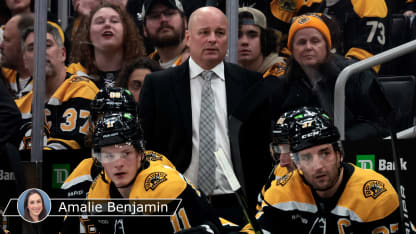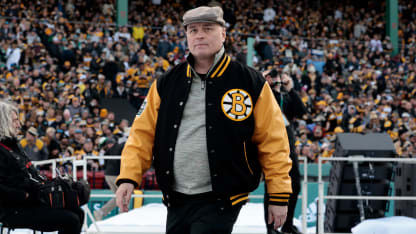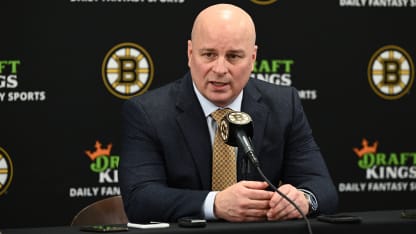Montgomery thriving with Bruins in 2nd chance as NHL coach
Positive approach helps him guide Boston to top of League standings after he was fired by Stars in 2019

"I could sense that his message was not as positive as it usually is and could have been," the Boston Bruins center said.
The hallmark of Montgomery's tenure with the Bruins has been a relentless positivity, a way of dealing with missteps and curveballs, fortified by his own difficult journey, that has allowed him to teach and guide and nudge his team in the right direction. It's a feeling that has suffused the Bruins dressing room.
But with Montgomery's team trailing the Pittsburgh Penguins in the third period of the 2023 Discover NHL Winter Classic on Jan. 2, Boston's struggle to break the puck out clean was getting to the coach.
"I didn't say much," Bergeron said. "It was like, 'We're OK. We're fine.' I think he understood."

It worked, the coach righted himself, the team righted itself, and they walked off the ice with yet another win in what has been a remarkable -- potentially historic -- season for the Bruins and their coach.
"I felt he was letting me know, you're not being yourself," Montgomery said. "He was doing it to help me, and I love the fact that he trusted me enough to listen. To me, it was a big moment in how I've improved over the years as a coach. I don't know if I would have listened to Patrice 10 years ago.
"But now I was like, he's right. I am being too negative."
Montgomery took a couple of deep breaths. The next time Bergeron and his line slid in front of Montgomery on the bench, the coach thanked his captain.
To be fair, it has been an easy season for Montgomery to be positive. With the All-Star break approaching, the first-year Bruins coach has seen his League-leading team, which is on pace for an NHL-record 64 wins, add itself to the League record books for consecutive home victories to start a season (14) and lose only six games in regulation (38-6-4).
As a result of all that success, Montgomery is set to coach the Atlantic Division in the 2023 Honda NHL All-Star Game at FLA LIVE Arena in Sunrise, Florida, on Feb. 4 (3 p.m. ET; ABC, ESPN+, CBC, SN, TVAS).
But none of this was guaranteed. None of it assured.
Which is why Montgomery turns to his phone each morning, why he opens an app called Gratitude, why he writes about what matters to him in his life, what he has, grounding himself in the present while he tries to slough off the past and put aside the future.
It's why he tries to be empathetic and understanding with his players (and that guy who cut him off in Boston traffic), comprehending just how human everyone around him is.
"You know he's a guy that's been humbled and has worked on himself," forward Nick Foligno said. "No one is perfect, no one in here is going to pretend they are. We appreciated that he worked on himself and he's got an opportunity.
"I think he wanted us to know that he's going to make the most of this. He's not going to let this go to waste."
\\\\
There is a lightness in the Bruins dressing room this season. Part of it is the historic run they're on, the seeming inability to lose, that has lifted them all into a dreamlike state. It's also Montgomery, whose message has resonated especially in contrast with that of former coach Bruce Cassidy, whom the Bruins fired on June 6, believing he was too tough on players, too public in his criticism.
It's a feeling that they all comment on, that they all notice, that they all crave. It's being seen, from the biggest stars in the room to the last player on the bench.
"It's not just 'Great hat trick, 'Pasta'," assistant coach Chris Kelly said, referencing forward David Pastrnak. "Everyone sees that. The average fan sees that. It's 'How did David get that goal?' It's the small details that led up to it that we all see. You hope the coach acknowledges it and he does. You feel worthy, is the best way to describe it."

There's a humanity there, steeped in the memory of his father, a boxer for Canada in the 1956 Melbourne Olympics who would routinely pick up kids who had no rides to hockey practice, who preached team first and who made sure everyone was included.
Montgomery's own coaching journey started early; he knew as soon as high school that coaching sang to him. And though he would go on to play 122 NHL games as a forward for the St. Louis Blues, Montreal Canadiens, Philadelphia Flyers, San Jose Sharks and Dallas Stars, plus 451 more in the American Hockey League, he understood that playing was temporary.
And that began with floor hockey. He was 15.
"I had the opportunity in high school to put my own floor hockey team together," Montgomery said. "I was just like, man, I really like putting certain players together, figuring out chemistry.
"I thought that my best strength in the game was my ability to see the game, and I just thought that the way I learned through a bunch of coaches of how to share that and make the game easier for players is something that really intrigued me."
Often he wouldn't play, preferring to tinker with his team, moving the chess pieces, testing how one player played with another, honing his strategies, finding his passion.
It blossomed further at the University of Maine, where he played for coaches like Shawn Walsh and Grant Standbrook, coaches who would lead the Black Bears to the 1993 NCAA championship in Montgomery's senior season.
"Those guys impacted my life a lot," he said. "But it was because of how creative and how charismatic and how good they were -- and how much they cared about the individuals and the growth of the team."
RELATED: [2023 All-Star Game lines as selected by NHL.com | Complete All-Star Game coverage]
He had always thought he would go back to Maine -- Walsh had promised him a spot on his staff -- but Walsh died of cancer at the age of 46 while Montgomery was still playing. He instead began a journey that would take him from Missouri of the United Hockey League as a player-coach, to Notre Dame as an assistant, to Rensselaer Polytechnic Institute, to Dubuque of the United States Hockey League -- where he won two championships -- and to the University of Denver.
And then he got the head job in the NHL with the Stars.
But less than a season and a half into that chance, Montgomery was fired Dec. 10, 2019, for what general manager Jim Nill called "unprofessional conduct inconsistent with the core values and beliefs of the Dallas Stars and the National Hockey League." He checked into an inpatient rehab center for alcohol abuse, followed by outpatient treatment. He got sober and made amends to his family and, on July 3, 2022, was hired by the Bruins.
It was the moment he had always hoped he would get again, a moment he and his wife and his family had worked toward, had strived for, had always believed would return, despite the lack of guarantees, the chances that his chance had slipped through his fingers.
"He's never been a guy to back down from a challenge," said John Miller, who chaired the search committee that brought Montgomery to Denver. "And he knew what he wanted. He knew he wanted his family. He knew how important Emily and the kids were and he knew he had to choose a different path. And there was never any doubt in my mind that he'd be successful doing it. Never."
\\\\
Sometimes, when Emily Montgomery is down, a text message will pop up on her phone. It's from her husband.
"He will pull out positivity kind of to a fault," Emily said, laughing. "I'll be having a bad day or whatever and he'll send me the Gratitude app for the day, like a screen shot. And I'll be like, oh my God I just want to kill you. I don't want to be there right now. But it does help bring you back and center you."
That positivity has been a necessary piece for Montgomery, as he works his way back from the moment that stopped his NHL career in its tracks.
"Players, for the most part, are always hard on themselves first," Foligno said. "So I think when you hear the negative, the negative, the negative, you just start to really think, man, is there anything I'm doing well? And then if you can put it in a way that encourages that guy, says 'This is a really good play, I like what your thought was, but try it this way.' Then it's, it was a mistake, I'm not a terrible player. Because every guy cares."
Montgomery concedes that, a few years ago, he would be all over a player on the bench after a mistake. Now, he lets it go.
He recalls an error by forward Pavel Zacha in the second game of the season, against the Arizona Coyotes. When Zacha returned to the bench, Montgomery told him, "Mistakes happen. We all make them. But you have the opportunity to go and change things with your next shift. That's where I want your attitude to be."
Zacha helped set up the tie-breaking goal in that 6-3 victory.
"Just a lot more empathetic," Montgomery said. "I think because I try to have an attitude of gratitude, I am not afraid to be vulnerable. … I try and think about the other person and what they're going through before I worry about how it affects me."
Maintaining that attitude takes work, Montgomery acknowledged, and "constant practice," much like the constant vigilance in his sobriety.
But players notice.
"He is able to show the players that he's human," said Todd Nelson, one of his assistants in Dallas who is now coach of Hershey in the AHL. "He gets to know players, gets to know their families.
"That's the hardest thing to explain to people. Some coaches do it naturally, some coaches try to do it and it comes across as being fake, but he's a very genuine person and you know where he stands."
Of course, there are limits to positivity, and Montgomery has shown he recognizes that.
"There's a fine line sometimes, where you cannot always be positive," Bergeron said. "But he'll show you clips and bring you in the office and say, 'These plays, we can't have those anymore.' It's helpful because it makes you understand what he wants. He's always more positive than negative."
Bergeron paused.
"It's almost like he counts how many times," Bergeron said, of the negative feedback compared to the positive. "Probably not. But the balance is always better on the [positive] side."
\\\\
Three years after the lowest moment of Montgomery's career, he has reached its peak, with the All-Star Game ahead of him and, beyond that, the Stanley Cup Playoffs. He is working every day, to feel gratitude, to better himself, to reclaim what he nearly lost.
"You can either choose to be held down by it or you can move forward and grow past and just get stronger," Emily Montgomery said.
That's where he is now. Stronger. More empathetic. More understanding. Reaching, every day, for the good.
At this point, there might be only two ways that the Bruins' -- and, therefore, Montgomery's -- story goes this season. Either they win the Stanley Cup, the crowning achievement in what might be one of the best seasons for any NHL team ever, or they don't, an ending akin to that of the Tampa Bay Lightning in 2018-19, when they went 62-16-4 -- tying the 1995-96 Detroit Red Wings for the single-season wins record -- and were swept by the Columbus Blue Jackets in the best-of-7 Eastern Conference First Round.
But Montgomery isn't thinking that far ahead. He isn't pondering what the Bruins have already done this season, or what they could in the future. He can't.
"Living in the past is no good," Montgomery said. "That's what it comes down to. And the future creates anxiety if you're worried about results. … I think through my personal struggles, I've really learned about letting go of the past and that's why staying in the moment, today, today is all you have."

















